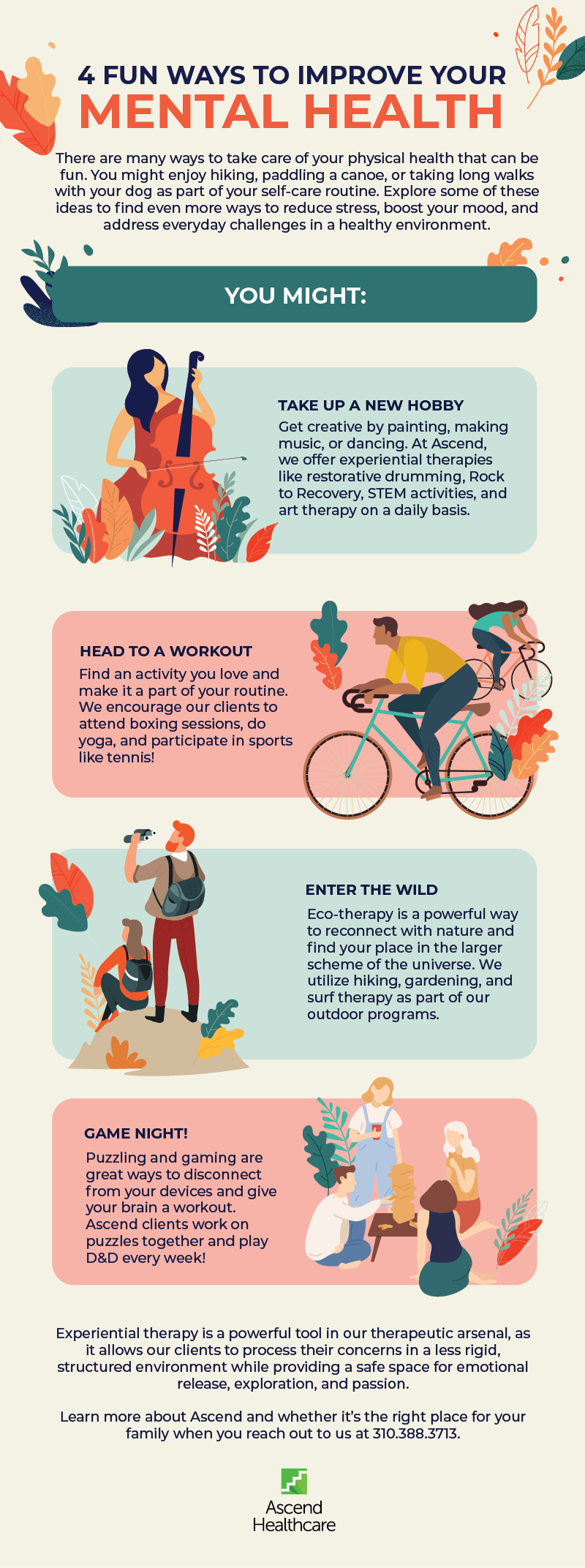If you’re a teen struggling with your mental health, there are many ways to find help. Therapy and medication are incredibly useful and effective tools, but they’re not the only ways to improve mental health. At Ascend, we believe that experiential therapy and passion projects can help you process difficult feelings outside of the constraints of therapy. There are many fun and enjoyable ways to improve your mental health through experiential solutions that make you happy.
Whether anxiety, depression, chronic stress, or any other mental health issue impacts your life, recreational activities can be a great way to boost your mood and ease anxiety. Check out our top four and discover how they can enhance your life today!
 1. Creative Hobbies
1. Creative Hobbies
Exploring your creativity through a new hobby can provide you with a passion project that is an amazing way to improve your mental health. These activities provide stress relief, serve as a distraction during difficult times, and can even help you actually process some of your traumas.
Maybe you’ve always wanted to learn how to play an instrument. Or maybe you’ve been interested in painting but you’ve never quite spent any time learning how. Taking up a new creative hobby you really enjoy gives you something to look forward to and releases those all-important endorphins. From the benefits of painting to the positive effects of music, studies have shown these activites can reduce stress, ease anxiety, and even improve memory.
Sometimes, it takes a little while to find a creative hobby you actually enjoy. But don’t give up, we’re confident you’ll find something to love. Consider the following options to get you started:
- Playing an Instrument
- Painting or Drawing
- Storytelling, Poetry, Writing
- Knitting or Crochet
- Filmmaking
- Pottery
- Woodworking & Carving
- Acting
- 3D Printing
2. Sports
Exercise is not only good for your physical health, but it’s also great for your mental health. It can help reduce stress, improve mood, and increase self-esteem. Even a moderate amount of exercise can make a big difference. A brisk walk around the block or a yoga class online are a great place to start, but you can also try more intensive activities, like running, boxing, and skateboarding. If you feel like a team activity might be a better choice for you, consider getting into school sports, like basketball, soccer, baseball, volleyball, or dance team as a way to improve your mental health.
3. Eco-Adventures
There’s something about being in nature that just makes us feel good. Studies have shown that spending time outdoors can improve functional independence, enhance social connections, boost cognitive abilities, and help you find relief from mental health disorder symptoms. We think eco-therapy is so powerful that we have an entire treatment center dedicated to it! So, take a hike, take up gardening, or just sit in the park and soak up the sun to see how nature can change your life.
4. Gaming & Puzzles
Since the advent of video games, many people have forgotten all about the joy of physical puzzles and board games. If you’re looking for a way to improve your mental health that doesn’t involve high-tech devices, this is a great solution for you.
Solitary gaming experiences include puzzles that can improve short-term memory, aid in problem-solving skills, and increase your thinking speed, as well as solo board games like Nemesis, Mage Knight, and Newton. You can also opt for group activities by doing large puzzles with friends or family, joining a Dungeons & Dragons group, or hosting weekly game nights!
Experiential Therapy for All!
These are just a few of the many ways to improve your mental health through experiential therapy solutions – and it’s part of the clinical approach at Ascend, too! We know all about the benefits of painting, music, writing, games, exercise, sports, and so much more because we use them every day to help our clients rediscover their passion for life. Take a chance on one of these hobbies and experiment to find what works best for you.
At Ascend, we believe that there’s no shame in seeking professional help if you’re struggling. Mental health is just as important as physical health, and we’re here if you’re ready for more intensive care to address your mental health concerns. Check your insurance coverage here, or reach out to our team right now at 310.388.3713.






